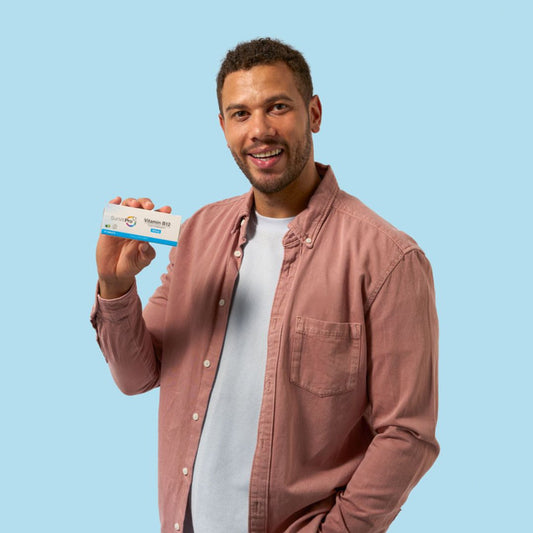Vitamin D plays a crucial role in maintaining bone health, supporting immune function, and promoting overall well-being. But with so much conflicting advice online, you may be asking yourself: What dosage of vitamin D is right for me?
The truth is that the correct vitamin D dosage varies depending on your age, health status, and lifestyle. In this article, we’ll break down recommended daily intakes, explain when higher or lower doses may be necessary, and show you how to personalise your intake with an at-home Vitamin D test kit.
Why Vitamin D Dosage Matters
Vitamin D helps the body absorb calcium, supporting the development of strong bones, teeth, and muscles. It also regulates immune system responses and contributes to mood stability.
However, deficiency is common in the UK due to limited sunlight exposure, especially in autumn and winter. Low vitamin D levels can lead to fatigue, muscle weakness, and increased risk of bone conditions such as osteoporosis.
Determining the correct vitamin D3 dosage is crucial for maintaining long-term health. Too little can leave you deficient, while too much may lead to side effects like nausea, high calcium levels, or kidney strain.
Recommended Vitamin D Intake
Guidelines from the UK Department of Health and NHS suggest the following:
-
Infants (under 1 year): 8.5–10 micrograms (340–400 IU) daily
-
Children (1–4 years): 10 micrograms (400 IU) daily
-
Adults and children over 4 years: 10 micrograms (400 IU) daily
-
Pregnant and breastfeeding women: 10 micrograms (400 IU) daily
These values are designed for general populations. However, many experts suggest that adults may benefit from higher intakes, particularly in northern climates or for individuals with limited sun exposure.
Factors That Affect Your Vitamin D3 Dosage
While standard guidelines are helpful, your individual needs may differ. Factors include:
1. Age
Older adults often need higher doses because the skin becomes less efficient at producing vitamin D from sunlight.
2. Lifestyle & Sunlight Exposure
People who spend little time outdoors, cover their skin, or live in cloudy climates may require higher supplementation.
3. Skin Tone
Darker skin tones naturally produce less vitamin D in response to sunlight, making supplementation even more important.
4. Body Weight
Research suggests that people with higher body weight may require larger doses for optimal blood levels.
5. Health Conditions
Conditions like Crohn’s disease, celiac disease, or kidney problems can affect how vitamin D is absorbed or activated, requiring personalised dosing.
Low Dose vs High Dose Vitamin D3
-
Low-dose vitamin D (400–1000 IU daily): Ideal for maintaining baseline health in healthy adults and children. A daily supplement such as the SunVit-D3 400IU Vitamin D3 Tablets is a simple option for everyday support.
-
Moderate dose vitamin D (1000–2000 IU daily): Often recommended for individuals with limited sun exposure or higher needs. Products like the SunVit-D3 1000IU Capsules or SunVit-D3 2000IU Tablets provide convenient daily support.
-
High dose vitamin D3 (5000 IU or more): Sometimes prescribed under medical supervision to correct deficiency. This should never be taken without advice from a healthcare professional. For those who have been recommended higher doses, SunVit-D3 5000IU Capsules are available, but always follow medical guidance before use.
How to Personalise Your Vitamin D Dosage
The best way to know your recommended vitamin D intake is through a blood test. Guesswork can lead to over- or under-supplementation.
With the Neovos Vitamin D3 Test Kit, you can measure your vitamin D2 and D3 levels with just a simple at-home finger-prick test.
How it works:
-
Collect your sample – Use the easy finger-prick kit to provide a few drops of blood.
-
Activate your test online – Register your kit with its unique code.
-
Send it back – Return your prepaid kit to the UK lab.
-
Get your results – Within 10 working days, you’ll receive a clear report with results and personalised recommendations.
This insight helps you choose the right vitamin D3 dosage for your body, instead of relying on generic guidelines.

Key Takeaways: Vitamin D Dosage Made Simple
-
Most adults need at least 400 IU (10 mcg) daily, though many benefit from 1000–2000 IU.
-
Factors like age, skin tone, weight, health, and sun exposure influence your ideal dosage.
-
High-dose vitamin D3 should only be taken with medical guidance.
-
The safest way to find your personalised dosage is with an at-home Vitamin D test.
Optimise Your Vitamin D Levels with SunVit-D3
At SunVit-D3, we provide high-quality vitamin D supplements tailored to your needs, from daily maintenance doses to higher-strength options recommended by healthcare professionals.
If you’re asking, “What dosage of vitamin D is right for me?” the answer starts with understanding your levels. Take control of your health today with the Neovos Vitamin D3 Test Kit and SunVit-D3’s trusted range of supplements.













1 comment
Great tips on vitamin D dosage! Personal needs vary, so it’s important to find the right amount for you. Also, calcium and vitamin D are essential for weight management and overall health (shemed.co.uk
).